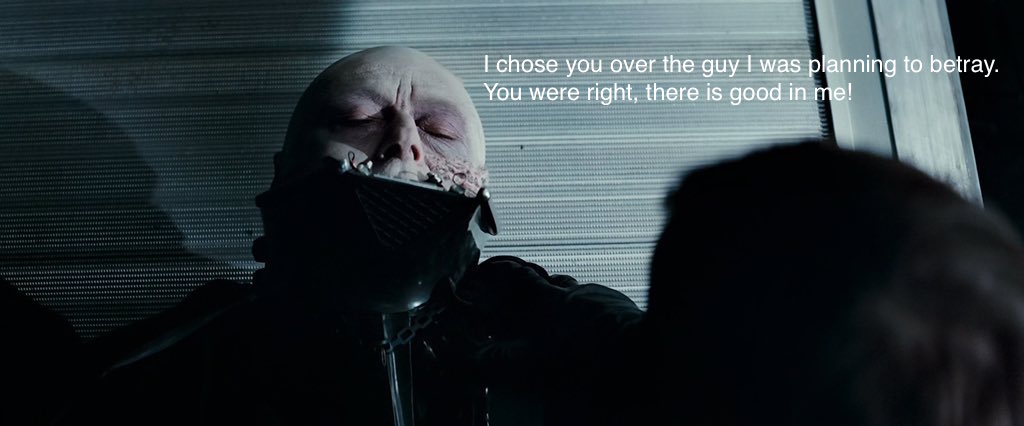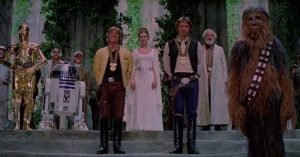In my last post, I talked about how the story goal was a problem for The Force Awakens, and that got me started thinking about the whole Star Wars series. It was a fun exercise, so I thought I’d share. I’m going to try to avoid totally giving away the endings, but I figure if you don’t know how the Star Wars movies end, then you probably don’t care.
I have absolutely no idea what the story goal for The Phantom Menace is supposed to be. Something about stopping a trade blockade? But that’s mostly offscreen for most of the movie. I think it might work best if you consider that Palpatine is the protagonist, and his goal is to be made chancellor. Everyone else is just running around being manipulated by him, thinking they’re doing one thing but it’s all part of his plan.
In Attack of the Clones, I think Obi-Wan is our protagonist, with his goal to track down who sent the bounty hunter, which leads him to learn about the clones. But still, I think Palpatine has his own plan to get emergency powers, which the rest of the movie is about, with him manipulating them into doing things that support him.
And that’s still going on in Revenge of the Sith, in which his goal is to take power and turn Anakin to the Dark Side.
I think the fact that the villain is driving the action of these movies may be part of why they’re not very satisfying. It’s not that much fun watching a master manipulator at work when the characters you’re supposed to like are being utter patsies and falling into all his traps. The tricky thing is that since these are prequels, the outcome was already decided. We know Palpatine has to win. The good guys can’t stop him. But there had to be better ways to go about structuring these stories to give the good guys more to do. My favorite part of the whole trilogy (aside from the truly epic lightsaber fight in the lava fields, which is even more impressive when you learn the actors trained hard to do most of it themselves) is the Obi-Wan plot of episode 2, where he actually has something to drive toward and has some success. Another thing that’s unsatisfying about this is that there isn’t really any room for character growth. I don’t feel like anyone truly learns anything or has real personal growth in this trilogy. As much as I like Obi-Wan in this, he’s a fairly static character. Anakin regresses. Palpatine doesn’t have a true protagonist arc, even as he’s driving the action. It’s not like he’s going through any kind of internal struggle.
As I mentioned previously, the goal in the original movie is to blow up the Death Star, with Luke as our clear protagonist.
The Empire Strikes Back is another villain-driven story. The only way I can make it work is to consider Darth Vader as the protagonist, and his story goal is to capture Luke so he can turn him to the Dark Side. The heroes don’t have the kinds of arcs that can drive a whole movie. Han and Leia just want to get their ship fixed so they can meet up with the fleet, and Luke wants to train to be a Jedi. Luke’s goal is more of a character goal than a story goal. Generally, a protagonist has to go through some kind of growth or change in order to carry out the story goal (like Luke learning to trust the Force before he can destroy the Death Star), but Vader fails here, so I guess he doesn’t go through that growth. But since it’s an evil goal, it may mean that since he didn’t pull off the evil goal, it meant he made the right choice and failed to be the villain he should have been.
In Return of the Jedi it gets pretty complicated. The big-picture goal is to blow up Death Star 2.0 while the Emperor’s on board, while the villains’ goal is to trap the Rebels and destroy the Rebel Alliance. But Luke has the secret goal to turn Darth Vader against the Emperor, while Darth Vader has the secret goal to turn Luke and gang up on the Emperor. All of these things are in opposition, and it’s zero-sum.
I was actually pretty disappointed in Return of the Jedi when it first came out, but I found myself liking it a lot more this time around, while I was less enthused about The Empire Strikes Back, which is considered by many to be the best of the films. I wonder how much of that is the dark=automatically good attitude.
I’ve already gone over the issues with The Force Awakens. The Last Jedi is a bit more focused, though it’s split into two plots that converge at the end. The Resistance wants to escape from the First Order, but there’s internal conflict because there are opposing factions within the Resistance who have different ideas for how they should go about this. Meanwhile, Rey’s side of the plot has her goal to recruit Luke to help the Resistance. Ultimately, this help is a big part of what allows the Resistance to escape. However, the protagonist isn’t all that clear. It’s Poe who learns the big lesson and undergoes a lot of change, though that doesn’t have much to do with whether they succeed or fail (he learns from the near-failure, but his learning the lesson doesn’t help them have success) and then there’s Luke realizing that he’s been wrong all along and finally taking action. I guess Rey learns not to be so afraid of the Force and to use it consciously when she lifts the rocks to allow the Resistance forces to escape through the tunnel.
In The Rise of Skywalker, the big-picture goal is to stop the First Order mega-fleet and deal with Palpatine once and for all. Rey’s our clear protagonist, as she has to face some tough truths about herself and finally open herself up to the Force in order to prevail, and she’s also helped by some groundwork she’s laid.
On the side stories, I think Han’s story goal in Solo is to free the woman he loves from what he sees as servitude, though things aren’t what he thinks. And Rogue One is about getting the information about the Death Star. That one has kind of a two-headed protagonist, with both Cassian and Jyn working together toward the same goal, in spite of having some conflict with each other. Basically, that movie is structured a lot like a romance, in spite of it not being romantic, and I think that may be a topic for another post because it’s an idea intriguing enough that I want to dig into it.
Incidentally, if you’re writing a story that’s not working, this is a good exercise to go through to spot plot problems. What is the story goal and who’s the protagonist? From there, you can figure out what the stakes and conflict are. This is also a good way to figure out what to focus on when writing a book blurb.


